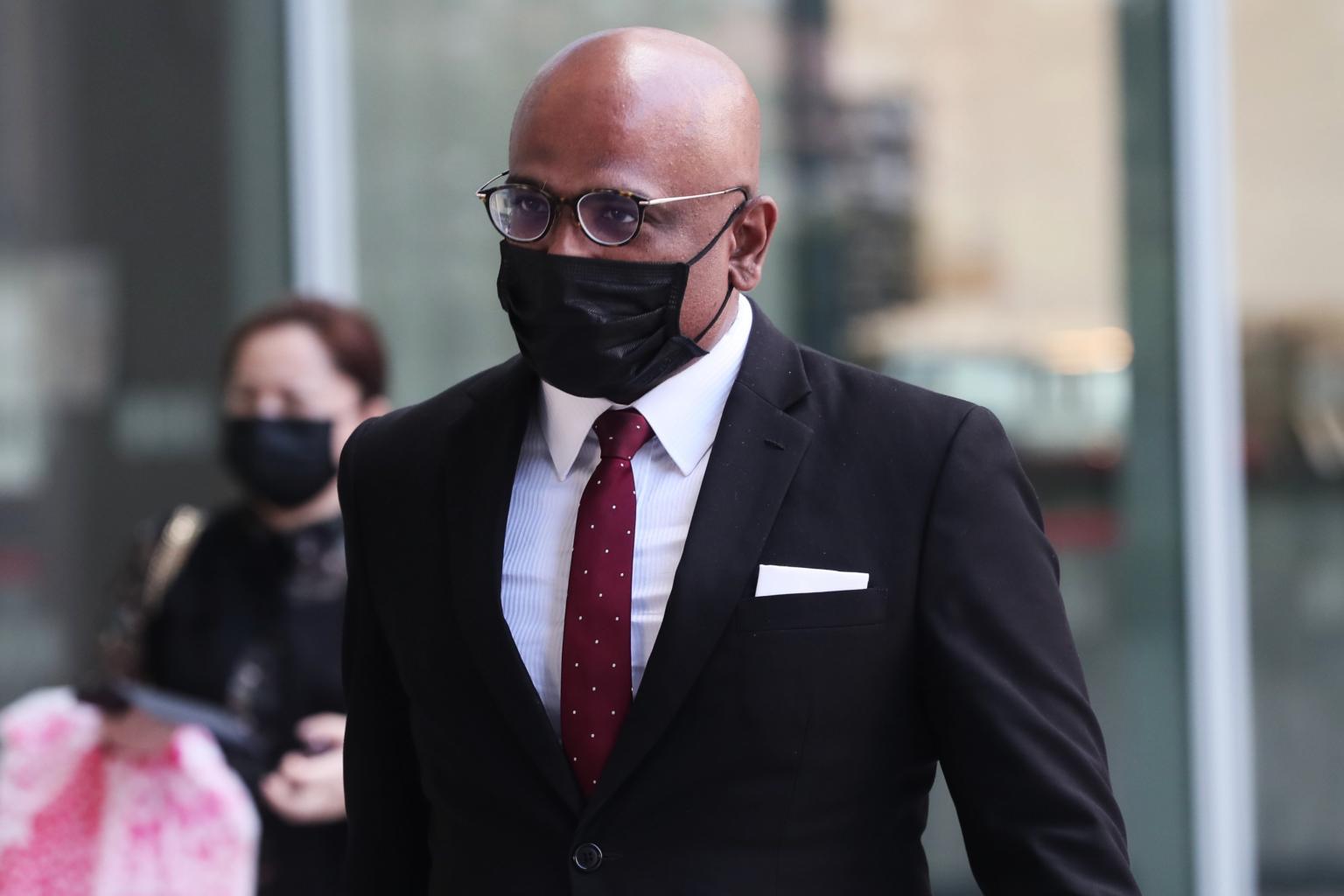TOC defamation trial: Defence lawyer M. Ravi questions witness' credibility
Sign up now: Get ST's newsletters delivered to your inbox

During the trial, Mr Ravi (above) complained to the court that Xu's lawyers had arrived late.
ST PHOTO: KELVIN CHNG
Follow topic:
SINGAPORE - The second day of the criminal defamation trial of The Online Citizen (TOC) editor Terry Xu and TOC contributor Daniel De Costa saw the latter's lawyer, Mr M. Ravi, attempting to cast doubt on the credibility of the prosecution's witness.
In his cross-examination on Tuesday (Oct 27), Mr Ravi quizzed Mr Sim Wee Lee - the owner of the Yahoo e-mail account used to send the allegedly defamatory letter at the heart of the case - on various details about his chequered past and his level of English proficiency.
De Costa and Xu were each charged with defaming members of the Singapore Cabinet in 2018 over the e-mail letter penned by De Costa and published by TOC, which claimed that there was "corruption at the highest echelons". The letter was signed "Willy Sum", a name sometimes used by Mr Sim.
De Costa was also charged with an offence under the Computer Misuse Act for using Mr Sim's Yahoo e-mail account to send the letter without permission.
On Tuesday, Mr Sim testified through a Mandarin interpreter that he became involved with an insurance fraud syndicate in 2008.
He said he cheated an insurance company by making false accident claims, took part in illegal soccer betting online and borrowed money from loan sharks as he was facing financial difficulties. Around the same time, his Vietnamese wife left him and moved to the United States with her 12-year-old daughter, whom Mr Sim had adopted.
Mr Sim said he was grateful to De Costa for being his listening ear during this difficult time and helping him arrange to see his MP, Mr Matthias Yao.
He had sought the MacPherson SMC MP's help in appealing to the Housing Board (HDB) for leniency in paying his service and conservancy (S&C) charges, but his appeals were unsuccessful and the HDB eventually repossessed his flat in 2012.
Mr Ravi asked if Mr Sim had developed unhappiness with the Government after he failed to get help with his various problems.
He referenced a 2008 TOC article, co-written by De Costa and one Glenn Tan, which had used Mr Sim's various problems to criticise the perceived inaction of political office holders and government agencies.
The article cited Mr Sim's full legal name and age, and contained an account of Mr Sim's encounters with loan shark harassment, his daughter's failed permanent residency application, his failure to get assistance from his Community Development Council and his difficulty in paying S&C fees to HDB.
Mr Sim replied: "Of course, when you make an application to a government agency and the application is rejected, at that period of time you will definitely feel angry. But after some time, the anger will lessen."
Said Mr Ravi: "I put it to you that you knew the article was to be published. You were unhappy with the Government and you told Daniel De Costa to publish it as you wanted your problems to go public."
Mr Sim disagreed, adding that he had confided in De Costa about his difficulties but was not informed that De Costa intended to publish such an article.
"Borrowing money from a loan shark is not something glorious. If Daniel had consulted me, I would not have agreed to let him use my full name and age," he said.
However, he conceded that he could not recall whether someone from TOC had contacted him before the article was published.
Mr Ravi also questioned if Mr Sim's standard of English was as poor as he had claimed. He noted that Mr Sim had passed English in his Primary School Leaving Examination and N-level exams, and also received spoken instructions in English during his national service (NS).
Mr Sim maintained that he had difficulty with English sentence structures and often needed help from his Mandarin- or Hokkien-speaking NS peers.
He had told the court on Monday that he had given the passwords to his e-mail accounts to De Costa as he was poor in English and needed De Costa's help to compose e-mails to the various government officials and agencies like the HDB.
During the trial, Mr Ravi complained to the court that Xu's lawyers had arrived late while he and his client were punctual.
At one point, he also suggested he might refuse to continue with the trial.
Mr Ravi claimed there was an appearance of bias on the part of District Judge Ng Peng Hong and called on the judge to disqualify himself. The judge declined to do so, and Mr Ravi then proceeded with the cross-examination.
The trial continues on Thursday.

